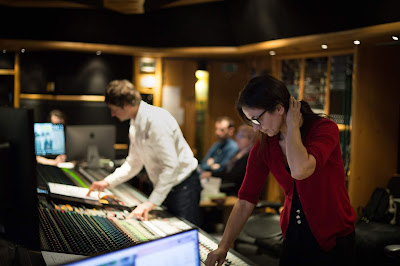 |
| Alexandra Harwood |
Reviewed by Robert Hugill on 3 June 2018 Star rating: (★★★★½)
Alexandra and the Russians - I Musicanti on a Sunday afternoon
This was the last in Leon Bosch’s wonderful Sunday afternoon series at St John’s Smith Square. I reviewed the first one in September [see Ruth's review]. The programmes have been made up of Russian pieces for flexible instrumental forces, around a new work from Alexandra Harwood and played by Bosch and his friends. On Sunday 3 June 2018, Leon Bosch and I Musicanti performed Prokofiev's Quintet in G minor Op. 39, Dmitri Smirnov's Dialogue in the Dark and Glinka's Septet in E flat, plus the world premiere of Alexandra Harwood's Ever After.
The first piece today was Prokofiev’s G minor Quintet with its original scoring for oboe, clarinet, violin, viola and bass. It was written for a circus-inspired ballet that was hardly performed as intended. In its surviving form it gives us a colourful, precarious world with a ‘band of [instrumental] misfits’, starting out with central Asian melismas, via Russian Orthodox bells with a cheeky andantino to finish.
Next was Dmitri Smirnov’s Dialogue in the Dark, written for Leon Bosch (the double bassist – we also had Leon Bosch the clarinettist for the first number). Drawing his inspiration from Shostakovich’s DSCH cryptogram, Smirnov based his piece first on the two syllables of the name Leon and then on the letters (more or less) of his last name: B flat [B] – A [O] – E flat [S] – C [C] – H [B natural]. He later showed me how, with a bit more cheating, he could make a tune out of anybody’s name, including my own. Dialogue in the Dark consisted of various near misses at finding each other in the dark, and ended with a long ambiguous silence as we decided if we should be sad or sanguine about this.
Alexandra Harwood’s minimalist piece Ever After was based around a recording of church bells from Rostov, staring simply and getting ever more complex until we heard (or imagined?) the sound of cowbells and a happy ever after ending. Harwood’s film-composer credentials were very much in evidence.
We ended the concert – and the series – on Glinka’s wonderful E flat Septet. Though Glinka was to become one of the defining figures in Russian music, this septet was written when he was not yet out of his teens and lay forgotten until the centenary of his death in the 1950s. The instrumentation as well as the style of this piece are highly idiosyncratic and not particularly Russian. The strings and winds were in varied and genial conversation throughout, with the bassoon and horn prominent and Julie Price relishing her bassoon moment in the sun.
For me this piece summed up the SJSS series perfectly: a group of friends and colleagues who had got together to do what they love. As well as his obvious mastery of his instrument, Leon Bosch has a genius for bringing together an eclectic group of people around an eclectic programme. I do hope they let us in on more of these Sunday afternoon treats.
Reviewed by Ruth Hansford
I Musicanti: Alexandra and the Russians at St John’s Smith Square, 3rd June 2018
Tomo Keller VIOLIN
Fenella Humphreys VIOLIN
Robert Smissen VIOLA
Richard Harwood CELLO
Leon Bosch DOUBLE BASS
Phillip Nodel OBOE
Leon Bosch CLARINET
Julie Price BASSOON
Sibylle Mahni FRENCH HORN
Prokofiev Quintet in G minor Op. 39
Dmitri Smirnov Dialogue in the Dark
Alexandra Harwood Ever After (world première)
Glinka Septet in E flat
Elsewhere on this blog:
- Writ Large: Peter Phillips & the Tallis Scholars in Spem in alium (★★★★½) - Concert review
- A visit to 1760s London: Ian Page and the Mozartists' Mozart in London (★★★½) - CD review
- Philosophical re-thinking: White Light from Hugo Ticciati & O/Modernt (★★★★★) - CD review
- Music & politics: Purcell's Welcome Songs for King Charles II (★★★★) - CD review
- Songs and duets from Carolyn Sampson and Iestyn Davies at the Wigmore Hall (★★★★) - concert review
- Liam Scarlett's new production of Swan Lake at the Royal Ballet - ballet review
- 90th birthday celebration: my interview with composer Thea Musgrave - interview
- Comedy & pathos: Mozart's Cosi fan tutte at Opera Holland Park (★★★★) - Opera review
- Elegie: Rachmaninoff, a heart in exile, Lucy Parham & Henry Goodman (★★★★) - Cd review
- Sparkling opener: Verdi's La traviata at Opera Holland Park (★★★★½) - Opera review
- The Dark Lord's music (★★★½) - CD review
- Worth seeking out: Verdi's La Traviata from Hampstead Garden Opera - (★★★½) opera review
- George Benjamin & Martin Crimp's Lessons in Love and Violence (★★★★½) - Opera review
- A heart in exile: pianist Lucy Parham talks about her latest composer portrait - interview
- Prophetiae Sibyllarum: Gallicantus (★★★★) - CD review
- Interesting programmes, strange timing - homages to Lully and Louis Couperin at London Festival of Baroque music (★★★★ / ★★★½) - concert review
- Musical style is like a language: I chat to German composer Moritz Eggert - Interview
- Home







,%20Giorgio%20Vasari,%20Palazzo%20Vecchio,%20Florence.jpg)

,%20William%20Morgan%20(Male%20Chorus)%20(c)%20Richard%20Hubert%20Smith.jpg)

No comments:
Post a Comment